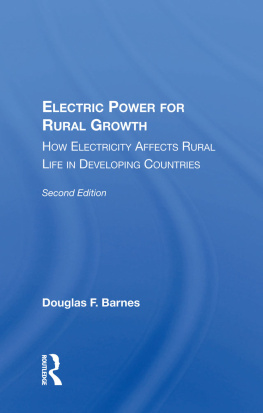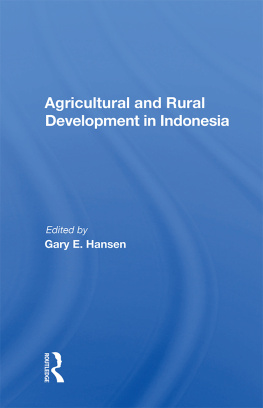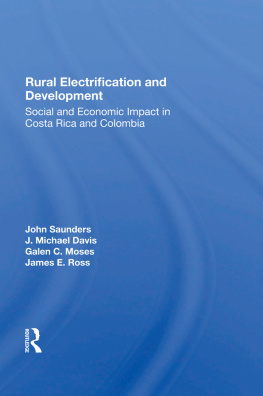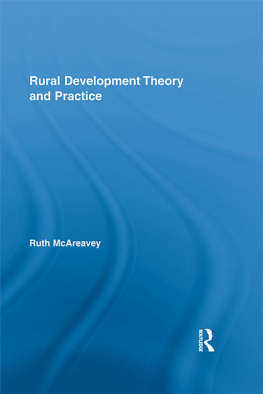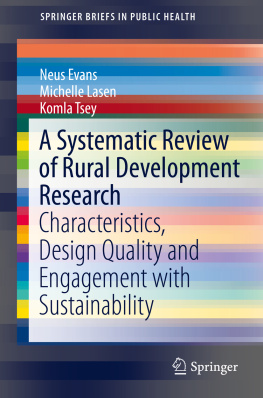Also by Douglas F. Barnes
Cleaner Hearths, Better Homes: improved Stoves for India and the Developing World
The Challenge of Rural Electrification: Strategies for Developing countries.
The Urban Household Energy Transition: Social and Environmental Impacts in the Developing World
Rural Energy And Development: Improving Energy Supplies for Two Billion People
Environmental Health and Traditional Fuel Use in Guatemala
Restoring Balance: Bangladesh's Rural Energy Realities
ELECTRIC POWER FOR RURAL GROWTH
Electric Power for Rural Growth:
How Electricity Affects Rural Life in Developing Countries
Second Edition
Douglas F. Barnes
First published 2014 by Westview Press
Published 2018 by Routledge
52 Vanderbilt Avenue, New York, NY 10017
2 Park Square, Milton Park, Abingdon, Oxon OX14 4RN
Routledge is an imprint of the Taylor & Francis Group, an informa business
Copyright 2014 Douglas F. Barnes
All rights reserved. No part of this book may be reprinted or reproduced or utilised in any form or by any electronic, mechanical, or other means, now known or hereafter invented, including photocopying and recording, or in any information storage or retrieval system, without permission in writing from the publishers.
Notice:
Product or corporate names may be trademarks or registered trademarks, and are used only for identification and explanation without intent to infringe.
Library of Congress Cataloging-in-Publication Data
Barnes, Douglas F.
Electric Power for Rural Growth: How Electricity Affects Rural Life in Developing Countries / Douglas F. Barnes.
2014
ISBN 13: 978-0-367-01223-6 (hbk)
Library of Congress Control Number: 2014919639
To my family, my wife Mary Ann, my daughter Andrea and my son Chris, who endured my time away for the frequent international travel that I spent writing the first edition of this book.
This is the second edition of my first book, published in 1988 based on research during my first job at Resources for the Future. At the time, international donors were having serious doubt about the benefits of rural electrification for developing countries. Today several aspects of this debate have changed. The international donors now are solidly behind the idea that poor people should have access to electricity. With the United Nations Sustainable Energy for All program highlighting the importance of providing electricity to even the most remote corners of the earth, the debate over the efficacy of rural electrification is historically relevant, but over.
In the 1980s, no one was counting the number of people that were without electricity, but projecting backward from recent trends, I estimate that during those times about 2.6 billion people had no access to electricity from grid systems. Today that number has shrunk to just over 1 billion, with about 2 billion people having gained access during that 30-year period. Countries like China, Thailand, Brazil and Mexico now have electricity access rates that are well over 95 percent, and they are working on the last remaining pockets of people without electricity. But this does not mean that the task is complete. Even a large country like India still has more than 200 million people without electricity, and in rural Africa, astoundingly, only 1 in 8 people in rural areas has electricity. So complacency is not the order of the day, and actions are still needed to bring a modern life to those living in extreme poverty or very remote areas.
The definition of rural electrification also has evolved due to technological changes in the way electricity service can be provided in more remote areas. The definition is becoming increasingly more complicated as new devices and systems are developed that offer a variety of electricity service levels.
With the exception of flashlights, historically the main source of electricity came from national or local grid systems. In addition to national grids, some regions had local or isolated grid systems generally based on either micro-hydro or diesel generators, and the distribution system did not extend beyond a local area, such as a town or group of towns. In the 1990s, the first generation of household off-grid technologies, such as solar home systems, was developed and marketed to consumers. These systems involved photovoltaic panels, coupled with a battery, mostly for a single home. More recently, even smaller household lighting systems have been developed. Although often unrecognized, for many years rural people have used car or motorcycle batteries as a source of power for watching television and lighting their houses. Today there are even more new developments, such as thermo-electric devices that can turn heat into small amounts of electricity when attached to household cooking stoves. These technologies are still in the early stages of marketing and development.
Among this wide variety of new systems and devices, the cost and level of service differ markedly. Moving from the grid to off-grid technologies increases the cost per kilowatt-hour and decreases the service. When it is reliable, the grid is the most desirable electricity service, but there are well-known constraints to extending grid electricity to remote areas of developing countries. These include the high costs involved in reaching remote areas and lack of local capacity to use much electricity. In such situations, off-grid technologies often are less expensive than the grid.
Since the original writing of this book, the development impact of grid electricity on rural households has been the subject of a significant amount of research. I am glad to report that the findings of this early study have been validated for the most part. Unfortunately, few current studies focus on the impact of solar home systems or small lighting systems on socioeconomic development. It is well-known that certain activities cannot be accomplished by relying on the low power levels available through solar home or smaller photovoltaic systems. The question is whether this matters or should such technologies be considered "pre-electrification"important in their own right but awaiting further expansion of grid electricity systems. These important new questions can only be answered by new research. In the meantime, I offer this second edition of my impact study of rural electrification that was conducted in the 1980s. The purposes of this book are to inform the issues in the public policy debate, advance empirical knowledge about the major issues and reach conclusions on the efficacy of various ways to implement rural electrification for development.
This entirely new production of the original book offers important historical information on the state of rural electrification in the 1980s. I have updated the text and titles, and the tables and charts have been revised for clarity. Some material that is no longer relevant has been omitted. I also have added a new chapter that summarizes the development of benefit evaluation methods, along with findings from recent research on the impact of rural electrification for development. But overall, the issues identified in the 1980s remain extremely relevant today in the context of the new international emphasis on providing modern energy access for all.

